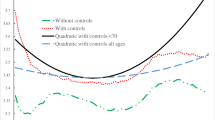Abstract
This article addresses the way that old age was represented within medieval European society and how that changed as the Middle Ages evolved into modernity. I argue that medieval society drew heavily upon the classical theme of the “ages of life,” embellishing them with a more explicit moral framework. Within this remoralized lifecourse, old age played a central part—whether framed as the end of life's journey toward wisdom and redemption, or as the eventual demise of all worldly success. As the economic and moral order of medieval society declined in the face of the new intellectual currents of the Renaissance and the rising commercialization of sixteenth century Europe, the moral identity of old age was gradually replaced with a social identity framed around lack and neediness.
Similar content being viewed by others
References
Aries, P. (1973). Centuries of Childhood. Harmondsworth: Penguin Books.
Bede. (1999). The Reckoning of Time (F. Wallis, Trans.). Liverpool: Liverpool University Press. (Original work published 725)
Beier, A.L. (1986). Masterless Men: the vagrancy problem in England 1560–1640. London: Methuen.
Boll, F. (1913). Die lebensalter, ein beitrag zur ethologie und zur geschichte de zahlen. Neue Altertumsgeschicte und Deutsche Lietratur, 16, 89–145.
Braudel, F. (1985). The Structures of Everyday Life: The limits of the possible. London: Fontana Press.
Burrow, J.A. (1986). The Ages of Man. Oxford: Oxford University Press.
Burstein, S.R. (1948). Care of the aged in England. Bulletin of the History of Medicine, 22, 738–746.
Cipolla, C.M. (1967). Clocks and Culture, 1300–1700. NY: Walker.
Clark, R. (1992). Modernization and status change among aged men and women. International Journal of Aging and Human Development, 36, 171–186.
Crosby, A.W. (1997). The Measure of Reality: quantification and Western society, 1250–1600. Cambridge: Cambridge University Press.
De Schweinitz, K. (1943). England's Road to Social Security. Philadelphia: University of Pennsylvania Press.
Dove, M. (1986). The Perfect Age of Man's Life. Cambridge: Cambridge University Press.
Geremek, B. (1996). Poverty. A history. Oxford, Blackwell.
Goodich, M.E. (1989). From Birth to Old Age: The human life cycle in medieval thought, 1250–1350. Lanham, MD.: University Press of America.
Henderson, J. (1997). Piety and Charity in Late Medieval Florence. Chicago: University of Chicago Press.
Herlihy, D. (1958). Pisa in the Early Renaissance: A study of urban growth. New Haven: Yale University Press.
Herlihy, D. (1967). Medieval and Renaissance Pistoia: The social history of an Italian town, 1200–1430. New Haven: Yale University Press.
Herlihy, D. (Ed.) (1968). Medieval Culture and Society. New York: Harper & Row.
Herlihy, D. & Klapish-Zuber, C. (1996). Census and property survey of Florentine domains and the city of Verona in the fifteenth century Italy [machine readable data file] Cambridge, Mass. Madison, Wis., University of Wisconsin. Data and Program Library Service.
Huizinga, J. (1955). The Waning of the Middle Ages. Harmondsworth: Penguin Books.
Lambert, M. (1998). The Cathars. Oxford: Basil Blackwell.
Le Goff, Jacques. (1960). Au moyen age: temps de l'église et temps du marchand. Annales: Economies, Sociétés, Civilisations, 15, 43–75.
Lee, G.R. (1984). Status of the elderly: economic and family antecedents. Journal of Marriage and the Family, 46, 267–275.
Leonard, E. M. (1900). The Early History of English Poor Relief. Cambridge: Cambridge University Press.
Markus, R. (1990). The End of Ancient Christianity. Cambridge: Cambridge University Press.
Minois, G. (1989). History of Old Age: From antiquity to the Renaissance. Oxford: Polity Press.
Moffat, M. (1986). The Poor in the Middle Ages: An essay in social history. New Haven & London: Yale University Press.
Parkin, T.G. (1998). Aging in antiquity: status and participation. In P. Thane & P. Johnson (Eds.), Old Age from Antiquity to Post-Modernity (pp. 19–42). London: Routledge.
Roebuck, J. (1979). When does “old age” begin? The evolution of the English definition. Journal of Social History, 12, 416–427.
Roebuck, J. & Slaughter, J. (1979). Ladies and pensioners: stereotypes and public policy affecting old women in England. Journal of Social History, 13,105–115.
Rösener, W. (1992). Peasants in the Middle Ages. Oxford: Polity Press.
Rosenthal, J.E. (1996). Old Age in Late Medieval England. Philadelphia: University of Pennsylvania Press.
Rowntree, B.S. (1903). Poverty: A study of town life. London: Macmillan.
Rubin, M. (1987). Charity and Community in Medieval Cambridge. Cambridge: Cambridge University Press.
Sears, E. (1986). The Ages of Man: Medieval interpretations of the life cycle. Princeton, NJ: Princeton University Press.
Shahar, S. (1997). Growing Old in the Middle Ages. London:Routledge.
Sheehan, M.M. (1990). Afterword, In M.M. Sheehan (Ed.), Aging and the aged In Medieval Europe (pp. 201–207). Toronto: Pontifical Institute of Mediaeval Studies.
Slack, P. (1990). The English Poor Law, 1531–1782. Cambridge: Cambridge University Press.
Tierney, B. (1959). Medieval Poor Law: A sketch of canonical theory and its application in England. Berkeley: University of California Press.
Troyansky, D.G. (1989). Old Age in the Old Regime: Image and experience in eighteenth century France. Ithaca, NY: Cornell University Press.
Author information
Authors and Affiliations
Rights and permissions
About this article
Cite this article
Gilleard, C. Aging and Old Age in Medieval Society and the Transition of Modernity. Journal of Aging and Identity 7, 25–41 (2002). https://doi.org/10.1023/A:1014358415896
Issue Date:
DOI: https://doi.org/10.1023/A:1014358415896




